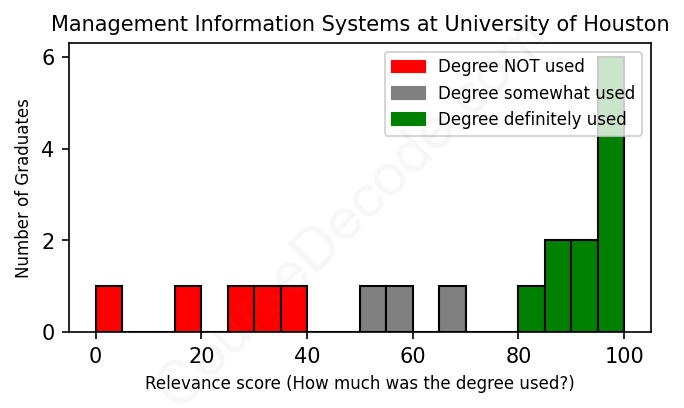
First, some facts. Of the Management Information Systems graduates from University of Houston we've analyzed , here's how many have used (or NOT used) their degree in their career:

These are estimates based on AI analysis of 19 LinkedIn profiles (see below).
The verdict? Slightly above average. Overall, with an average relevance score of 68%, Management Information Systems graduates from University of Houston have a slightly higher likelihood (+1%) of finding work in this field compared to the average graduate across all fields:
And for comparison, here's the chart for all profiles we've looked at across all degrees.
Also, after graduating, only 5% of these graduates have pursued further education other than another Bachelor's degree (such as a Masters degree or other), compared to the average across all profiles of 35%. This suggests a Bachelors degree is enough for most Management Information Systems graduates, and it's normal to look for work straight after graduation.
See the details:
|
Relevance score: 31% We think this person has NOT gone into a career related to their degree. We think this person has NOT gone into a career related to their degree.
DEGREE INFOGraduated in 2017 from University of Houston with a Bachelors Degree in Management Information Systems. No other secondary education since. JOB HISTORY SINCE GRADUATIONIndependent Contractor Self Employed Jan 2018 - May 2018 Auditor  Texas State Auditor's Office Jun 2018 - Jan 2019 ABOUTGraduated from the University of Houston with experience in development, database management, project management, and client relations. I am passionate about advancements in information technology, and keeping up to date on research and breakthroughs in this field. I have experience in multiple languages including Java, Python, PL/SQL, and SQL and am eager to learn more. |
The top 10 most common jobs done by the graduates we've analyzed (ranked most common to least) are:
The job outcomes for graduates from the Management Information Systems program at the University of Houston show a diverse array of career paths. Many graduates have taken up roles as Business Analysts and System Analysts, which are closely aligned with the skills emphasized in their curriculum. These positions often require a solid understanding of information technology and management principles, making them highly relevant. On the other hand, there are graduates who have ventured into fields like real estate or customer support, where the direct application of their MIS knowledge is minimal. For instance, positions such as Licensed Realtor or Customer Support Analyst involve more customer interaction and sales skills rather than the technical information systems knowledge they acquired during their studies.
In summary, while there are significant numbers of Graduates successfully applying their Management Information Systems knowledge in roles like Business Analysts, Project Managers, and Technical Consultants, there are also many who have found themselves in areas that don't directly connect to their degree. So, while the program equips students with valuable skills, the relevance of those skills in their subsequent jobs varies quite a bit. This highlights the importance of aligning job choices with one’s educational background for the best career outcomes!
Here is a visual representation of the most common words in job titles for Management Information Systems graduates (this is across all Management Information Systems graduates we've analyzed, not just those who went to University of Houston):

Graduates from the University of Houston's Management Information Systems program have generally found a variety of careers that align well with the skills they developed during their studies. Many of them seem to start off in entry-level roles such as business analysts, system analysts, or support positions shortly after graduation. For instance, alumni from 2013 began as system analysts and business analysts before climbing the ranks to project managers and IT program managers within reputable companies like J.P. Morgan and Deloitte. This indicates that the program sets students up for relevant opportunities in the tech and business sectors right out of college.
Looking five to ten years down the line, many graduates are making significant strides in their careers. Several have taken on senior roles, such as senior consultants and program managers. For example, a 2013 graduate transitioned from being a system analyst to a senior consultant at Deloitte. Others have even become business owners or executives, like the individual who became a CEO after starting with a business analyst role. Although a few graduates ended up in positions that might not directly relate to management information systems—like real estate—most appear to maintain a trajectory in tech-related fields, suggesting that the degree opens doors to a multitude of job opportunities that are both rewarding and relevant to their education. Overall, it looks like a solid investment for those interested in tech and management careers.
Honestly, a Bachelor’s degree in Management Information Systems (MIS) at the University of Houston, like many schools, can be a mix of challenging and manageable, depending on your background and interests. If you’re comfortable with tech and data, you’ll likely find it pretty engaging, but there are definitely some tough classes, especially when you dive into programming or systems analysis. Overall, it’s not considered the easiest degree out there, but it’s also not on the hardest end of the spectrum either; you just need to be willing to put in the effort and stay organized. If you like problem-solving and working with technology, you might find it more fun than difficult!
Most commonly, in the LinkedIn profiles we've looked at, it takes people 4 years to finish a Bachelor degree in Management Information Systems.
Looking at the jobs these University of Houston Management Information Systems grads have landed, it seems like many of them are doing pretty well for themselves. The ones who graduated earlier, especially those at J.P. Morgan and Deloitte, likely rake in solid six-figure salaries; that’s pretty sweet considering they started right after college. The entrepreneurs and executives, like the CEO from 2012 and the commercial realtors, probably also have decent earnings, especially if they’re successful in their fields. Some of the recent grads might still be climbing the ladder, but even in entry-level roles, many tech positions pay better than average starting salaries. Overall, it looks like these folks are on a good path towards solid earnings and career growth!
Here is a visual representation of the most common words seen in the "about" section of LinkedIn profiles who have a Bachelor degree in Management Information Systems (this is across all Management Information Systems graduates we've analyzed, not just those who went to University of Houston). This may or may not be useful:

Here are all colleges offering a Bachelor degree in Management Information Systems (ordered by the average relevance score of their Management Information Systems graduates, best to worst) where we have analyzed at least 10 of their graduates:
| College | Score | Count |
|---|---|---|
 The University of Alabama The University of Alabama
|
93 | 18 |
 The University of Georgia The University of Georgia
|
84 | 12 |
 University of South Florida University of South Florida
|
83 | 10 |
 University of Alabama University of Alabama
|
83 | 19 |
 San Jose State University San Jose State University
|
79 | 16 |
 University of Maryland Baltimore County University of Maryland Baltimore County
|
79 | 10 |
 University of Georgia - Terry College of Business University of Georgia - Terry College of Business
|
77 | 18 |
 University of Arizona University of Arizona
|
76 | 14 |
 Penn State University Penn State University
|
73 | 11 |
 Ohio University Ohio University
|
73 | 10 |
 Oklahoma State University Oklahoma State University
|
73 | 17 |
 Baylor University Baylor University
|
73 | 12 |
 University of Houston, C.T. Bauer College of Business University of Houston, C.T. Bauer College of Business
|
73 | 20 |
 Texas A&M University Texas A&M University
|
70 | 10 |
 The University of Texas at Austin The University of Texas at Austin
|
68 | 12 |
 University of Houston University of Houston
|
68 | 19 |
 East Carolina University East Carolina University
|
64 | 11 |
 Washington State University Washington State University
|
64 | 14 |